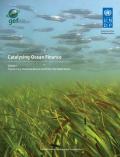
This report seeks to provide practitioners with the tools and information needed to respond to the public expenditure policy and management challenges arising from climate change. It is a series of notes and supporting materials written as a first step towards consolidating current research and international experience, identifying emerging practice and providing practical and applicable guidance for staff of central finance agencies, development agencies, environmental agencies and other international organizations working on climate change issues. In addition to emphasizing the importance of strengthening national systems throughout, the Sourcebook focuses on the specific public expenditure policy and management challenges posed by climate change, such as decision-making in the face of uncertain future climate conditions, expenditure planning for extreme weather and climate events, the lack of agreed budget definition and classification of climate change activities.
This study shows how transport affects social, economic and environmental sustainability. It deals with issues and best practices for inland transport, namely road, rail, inland waterway and intermodal transport. It also outlines UNECE contributions and reviews progress towards the development of more sustainable inland transport.
This report outlines a range of systemic interrelated measures for a progressive transformation towards low-energy, low-carbon, highly resilient and ultimately climate neutral cities. Its recommendations fall under four main headings, with coordination through a well managed city-level framework being perhaps the most essential ingredient for success.
1) Waste management: Options and criteria for recycling, the production of biofuels and incineration.
2) Low-carbon mobility: Disincentives for using cars, along with the promotion of non-motorised and good public transport, and the introduction of alternative fuels infrastructure.
3) Urban energy infrastructure: Incentives to stimulate increased use of renewable energy, and promote energy-efficient technologies and intelligent electric grid systems for city facilities.
4) Urban form and green spaces: Techniques to reduce and prevent sprawl, while preserving and expanding green and open spaces, mitigating the urban heat island effect.
This report illustrates the multiple environmental, economic and social benefits arising from a transition towards energy-efficient housing. It outlines the required institutional changes and provides some basic principles for successful policies.
The study intends to reach national policymakers, decision-makers and experts and aims to facilitate a sustainable transition to energy efficient housing.
The report includes case studies from Austria, Russia, Kyrgyzstan, and Bulgaria.
